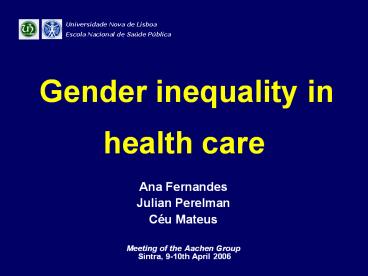Gender inequality in health care - PowerPoint PPT Presentation
1 / 30
Title:
Gender inequality in health care
Description:
Universidade Nova de Lisboa Escola Nacional de Sa de P blica Gender inequality in health care Ana Fernandes Julian Perelman C u Mateus Meeting of the Aachen Group – PowerPoint PPT presentation
Number of Views:94
Avg rating:3.0/5.0
Title: Gender inequality in health care
1
Gender inequality in health care
Universidade Nova de Lisboa Escola Nacional de
Saúde Pública
- Ana Fernandes
- Julian Perelman
- Céu Mateus
- Meeting of the Aachen Group Sintra, 9-10th
April 2006
2
General focus
- Health services achieving
- Universality
- Solidarity
- Equity in access/outcomes
- Health policies
- Promoting adequacy of health services
- Sensitive to the changing health needs of citizens
3
Dimensions of inequality
Socio-economic - income - education - profession
V e c t o r s o f a n a l i s y s
Mortality
Health
Morbidity
Use
Health care provision
Geographic - regions - counties - municipalities
Access
Resources source
Funding
- Age
- Gender
Resources allocation
4
Research on gender inequalities in health care
- Inequalities in access / treatment for
- Cardiovascular diseases
- Cerebro-vascular diseases (stroke)
- Diabetes
- Dialysis and kidney transplant
- Screening for lung cancer
- HIV/AIDS (access to antiretroviral therapy)
- Higher use of pharmaceuticals among women
5
Cardiovascular diseases Gender inequalities in
treatment
- In early stage (before AMI) women have lower
access to - non-invasive procedures (stress test)
- diagnostic high-technology procedures
(angiography) - revascularization (PCI or bypass)
- In admissions for acute myocardial infarction
- lower access to bypass, but equal or higher
access to PCI - higher mortality and harder recovery for women
after bypass - several studies do not ascertain any gender
inequality in access to high-tech treatment
6
Cardiovascular disease causes for gender
inequalities in treatment
- Lower access related to womens lower
socio-economic status (lower access to private
insurance, out-of-pocket payments, poorer
information) - Physicians discrimination
- Subjective
- Objective due to higher difficulty in
interpreting or targeting symptoms (male-oriented
research and guidelines) - Higher reluctance by women to follow invasive
treatments
7
Socio-economic inequality related to gender
- In all OECD countries, women have, on average, a
lower socio-economic status than men - In 2002, in Portugal, the average monthly income
was 601 for women and 747 for men
8
Women's average pay as of men's - 2004
Notes figures are for 2004 except 2002,
2000, 2003, 1998, 2001
Source EIRO
9
Inequity in access to general practitioner
10
Inequity in access to general specialist
11
Womens health
- Main priorities when studying womens health
- Main causes of death
- Diseases with a higher prevalence
- Reproductive health
- Violence against women
- Health determinants
Chesney and Ozer, 1995
12
Womens health
- Main priorities when studying womens health
- Main causes of death
- Diseases with a higher prevalence
- Reproductive health
- Violence against women
- Health determinants
Chesney and Ozer, 1995
13
Main causes of death
- Cardiovascular diseases
- Stroke
- Female cancers (breast, uterus cervix, ovary)
- Cancer of colon and rectum
- Lung cancer
- Sources
- http//www.euro.who.int/
- P. Boyle J. Ferlay Annals of Oncology 16
481488, 2005
14
Age-standardized death rates from cardio-vascular
disease, women aged 35-74, latest available year
Source World Health Organization
(2004) http//www3.who.int/whosis/menu.cfm
www.heartstats.org
15
Age-standardized death rates from stroke, women
aged 35-74, latest available year
Source World Health Organization
(2004) http//www3.who.int/whosis/menu.cfm
www.heartstats.org
16
Source Atlas of Health in Europe,
2003 http//www.euro.who.int
17
Source Atlas of Health in Europe,
2003 http//www.euro.who.int
18
Source The European Health Report,
2005 http//www.euro.who.int/ehr2005
19
Womens health
- Main priorities when studying womens health
- Main causes of death
- Diseases with a higher prevalence
- Reproductive health
- Violence against women
- Health determinants
Chesney and Ozer, 1995
20
Diseases with higher prevalence
- Chronic diseases and mental health diseases
Chronic diseases in Portugal
Source National Health Survey, 1998/99, ONSA
21
Womens health
- Main priorities when studying womens health
- Main causes of death
- Diseases with a higher prevalence
- Reproductive health
- Violence against women
- Health determinants
Chesney and Ozer, 1995
22
Source Atlas of Health in Europe,
2003 http//www.euro.who.int
Source Atlas of Health in Europe http//www.euro.
who.it
23
Source Atlas of Health in Europe,
2003 http//www.euro.who.int
24
Source Atlas of Health in Europe,
2003 http//www.euro.who.int
25
Womens health
- Main priorities when studying womens health
- Main causes of death
- Diseases with a higher prevalence
- Reproductive health
- Violence against women
- Health determinants (tobacco and alcohol
consumption, physical activity, etc.)
Chesney and Ozer, 1995
26
Womens health
- Womens health is an issue that goes well beyond
gender inequalities in access and treatment
27
European Health Report 2005
- Differences across countries and population
groups indicate how much impact policies to
prevent and control major risk factors could
have
28
Research Outline for Portugal
- Inpatient administrative data
- Waiting lists
- IMS
- Outpatient administrative data (GP, specialists
care)
29
Waiting times in Portugal gender bias?
30
Discussion
- To reduce gender inequality in health care,
socio-economic inequalities have to be addressed - To tackle gender-related inequalities, health
policies will vary according to relevant
inequalities - a strong effort should be put on ascertaining
causes and relevance of differences - Research on gender inequalities in health care
related to access and to treatment is not
conclusive - Systematic comparison of womens health
conditions and assessment of health policies
promoting gender equality should figure in the
agenda of a European Institute for Gender
Equality.
31
Gender inequality and socio-economic inequality
- Inequity in access to care
- gender socio-economic inequalities
- gender inequalities in access to care?
- Reducing gender inequality in access should start
with reducing socio-economic inequality in access!































